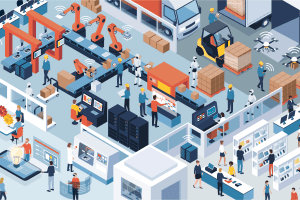The complex world of APIs and the short-term rental tech industry

Emil Majkowski, CIO and chief architect of the Rentals United platform shares his insight into the technical aspects of the short-term rental industry.
An industry ecosystem is a network whereby all the suppliers, distributors, organisations, customers, competitors and regulatory bodies are connected. Through the delivery of a service or a product, players in the ecosystem are linked to each other by their various relationships. Supply and demand cycles maintain the movement and growth of the ecosystem, but it is the flow of data/knowledge between them which maintains that essential connection. In the short-term rental ecosystem, technology has emerged as the growth facilitator, enabling connectivity and driving success in this space.
The short-term rental industry grew by 7 percent in 2019 to a total of $115 billion and as the market continues to mature, (albeit within the new constraints of a post-Coronavirus world), and competition heightens, professional property managers are increasingly choosing to improve their use of technology to help them stay ahead of the game. They are adopting more and more software solutions in a race to automate operational and guest experience facets of their businesses from distribution, marketing, revenue management, through to guest communication and other tasks.
A recent tech report reveals that there are four core areas in which property managers use additional tech for their operations. These are channel management (57%), payment providers (51%), accounting tools (40%) and keyless entry solutions (33%). Emerging technologies coming through include 3D tours (17%), chatbots (13%), home automation solutions (12%), noise control devices (9%) and voice concierge services (3%).

So the ecosystem in the short-term rental industry is complex, competitive but also expanding as the technology at play allows businesses to become more efficient, offer better services to their guests, and thereby scale sustainably. But if this industry is to continue scaling in this way, is the tech connected enough? Is it up to the job?
Connected tech, smart tech, is all around us: in our homes, in our cities, as we travel around. Most of it is powered by APIs, an application programming interface, which is a set of routines and tools for connecting software.

If you take a car workshop as an analogy, we at Rentals United, as channel managers in the short-term rental industry, are the mechanics given the car parts from different manufacturers, from BMW, Mercedes or Peugeot for instance, and then tasked with building and servicing a high performance sports car. The sports car must function efficiently, at speed and smoothly. It can’t break down.
As a channel manager company within this space we are sitting at the heart of the ecosystem, funnelling more than 56 billion APIs and 150 complex connections to allow property managers to connect with OTAs and to sell rental bookings.
Read More: Smart City Strategies and the Forgotten Visitor Economy
APIs, just like the mechanics, are vital and they need to be high functioning all of the time. This is no easy task and if the short-term rental industry is going to continue scaling at pace then the APIs will need to be robust enough to facilitate that growth. That translates into investment and standardisation, in practical business terms.
As a channel manager, tech is the core of our business and we invest heavily on behalf of property managers and the channels to maintain connectivity and to standardise tech across the board.
The concept of the ‘connected trip’ is a buzzword right now in the travel industry, and has been for a while, whereby major brands, such as Expedia, have joined Airbnb and Google in an arms race to deliver this holy grail of a frictionless trip. What this looks like in practice is a traveller floating through a journey, supported by technology, which adjusts to delays and varying preferences. The key phrase here is ‘supported by technology’ and it takes us right back to the beginning of this article where I highlighted that the short-term rental ecosystem is connected by tech.
Technology, API connectivity, requires constant nurturing and investment if it is to perform like the sports car we all want and increasingly need. If travellers demand a connected trip when they go on business or take their family on holiday or city planners embed smart tech in their cities, the right tech, the right connections need to be in place to make it all run smoothly.
